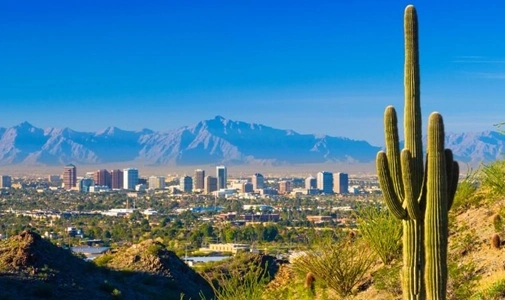Arizona, known as the Grand Canyon State, is an increasingly popular destination for people looking to relocate. With its breathtaking desert landscapes, warm climate, and growing cities like Phoenix and Tucson, Arizona has a unique appeal. But while many are drawn to its sun-soaked charm, life in Arizona comes with both perks and drawbacks. Whether you’re moving for work, retirement, or a lifestyle change, here’s a comprehensive look at the pros and cons of living in Arizona.
Pros of Living in Arizona

1. Abundant Sunshine
Arizona is one of the sunniest states in the U.S., with cities like Phoenix averaging over 300 sunny days per year. If you’re someone who thrives in warm, dry climates and loves being outdoors year-round, Arizona offers the perfect environment. Say goodbye to gloomy, gray days.
2. Low Humidity
The dry desert climate means low humidity levels, especially in central and southern Arizona. This is a big advantage for those who find sticky, humid air uncomfortable. The dry heat also means fewer issues with mold, mildew, and bugs compared to more humid regions.
3. Outdoor Recreation and Natural Beauty
Arizona is a haven for outdoor enthusiasts. From hiking in Sedona’s red rock country to exploring the Grand Canyon or camping in the mountainous forests of Flagstaff, the state offers diverse terrains. You can enjoy year-round activities like rock climbing, biking, golf, and stargazing in some of the clearest night skies in the country.
4. Lower Cost of Living (Compared to Coastal States)
While Arizona’s cost of living has risen in recent years, it still remains lower than in coastal states like California or New York. Housing is more affordable in many areas, particularly in smaller towns and suburbs. Utilities, property taxes, and daily expenses can also be more budget-friendly depending on the city.
5. Booming Job Market
Arizona has seen significant economic growth over the past decade. Major sectors include technology, healthcare, manufacturing, and renewable energy. Companies like Intel, Amazon, and Apple have established operations in the state, especially around the Phoenix metro area. This has translated into job opportunities and a growing economy.
6. Retirement-Friendly
Arizona is consistently ranked among the best states to retire. The sunny weather, lack of snow, affordable housing, and abundance of golf courses and active adult communities make it ideal for retirees. Certain areas also offer tax breaks for retirees, making it a financially smart move for seniors.
Cons of Living in Arizona
1. Extreme Summer Heat
While the sun is a plus for many, the summer temperatures can be intense—especially in the Phoenix and Tucson areas. It’s not uncommon for the mercury to hit 110°F (43°C) or higher during summer months. Outdoor activities are often limited during this time, and air conditioning is essential for daily life.
2. Limited Water Resources
As a desert state, Arizona faces long-term challenges with water scarcity. Drought conditions, reliance on the Colorado River, and rapid population growth have put pressure on the state’s water supply. Conservation efforts are ongoing, but concerns about water sustainability are very real for long-term residents.
3. Dust Storms and Wildfires
Arizona experiences seasonal dust storms, or “haboobs,” that can significantly reduce visibility and air quality. Wildfires are also a concern in forested and mountainous regions during the dry season. These environmental hazards, while manageable, are something to consider when choosing where to live.
4. Limited Public Transportation
Public transportation is limited in most Arizona cities. Outside of central Phoenix and Tucson, a car is pretty much a necessity. Long commutes and a car-dependent culture can lead to traffic congestion, particularly as cities continue to grow.
5. Higher Electricity Bills in Summer
Air conditioning is a non-negotiable during Arizona’s hot summers, which means high electricity bills for many households. Even though energy prices aren’t the highest in the nation, the sheer demand for cooling pushes utility bills higher than average from May through September.
6. Fluctuating Housing Market
While housing in Arizona has historically been more affordable, the recent influx of people from other states—especially California—has driven up demand and prices. Homebuyers and renters alike have seen sharp increases, particularly in cities like Phoenix and Scottsdale. This could be a con for newcomers entering a competitive real estate market.
Conclusion: Is Arizona Right for You?
Arizona offers a unique blend of natural beauty, economic opportunity, and outdoor lifestyle that’s hard to beat. With year-round sunshine, diverse landscapes, and a growing economy, the state is an attractive option for many people—especially those escaping the high costs and fast pace of larger coastal cities.
However, it’s important to weigh those benefits against the realities of desert living. The intense summer heat, limited water supply, and reliance on cars may not suit everyone. Prospective residents should also consider the region’s environmental risks and rising housing costs when making their decision.
If you’re someone who loves the sun, enjoys outdoor adventure, and values space and affordability, Arizona could be a great fit. Just be ready to adapt to the climate and lifestyle that come with desert living.
Tip: Before committing, spend a summer month in the area you’re considering. It’s the best way to know if you can handle the heat—and everything else Arizona has to offer.



